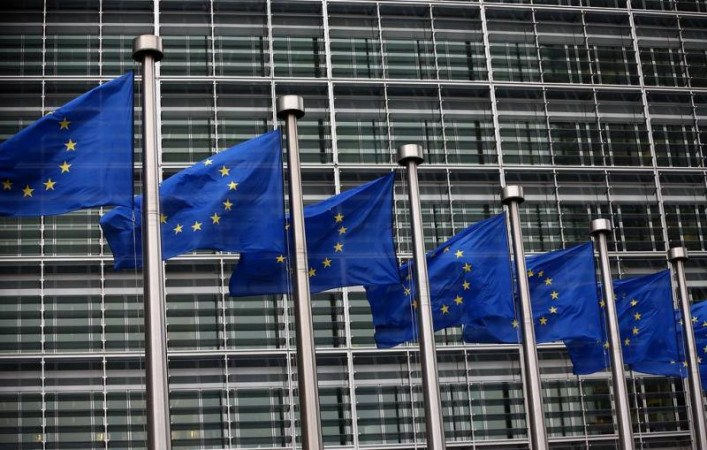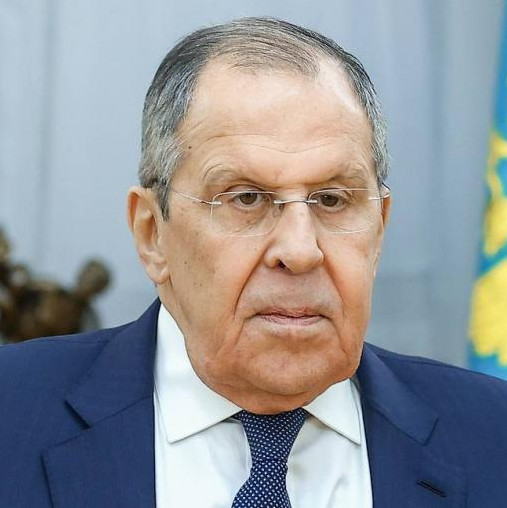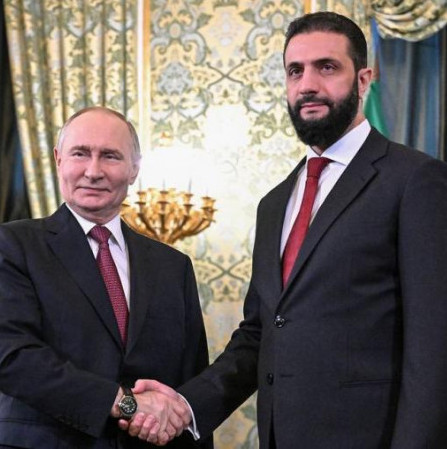Politics
Georgia: for Eight Years Roses Have Much Faded
Political monism, created in Georgia - is unique
Georgiy Tetradze

In the next anniversary of the Rose Revolution, a monument to Ronald Reagan appeared for some reason or other in the center of Tbilisi, while he, at the mention of Georgia, may have begun to search on the map the American State of the same name. Instead of the monument to the great king David the Builder carried out on the outskirts of the capital city, a pure insanity is installed in the form of a 15-foot bicycle with two seats and handlebars in different directions, and in Batumi - a giant rubber slipper stands conspicuously on some dinosaur eggs. Stuff and nonsense! But it must please people. So say authorities - those who are not with us are against us. Who is against is the Russian agent.
Authorities with their own hands propagate opponents, new enemies, who are assured, let us suppose, that millions paid to the insane French sculptor who installed a handlebar bicycle in the center of Tbilisi, could just have been given to the unemployed.
Georgia celebrates the next anniversary of the Rose Revolution. The eighth in succession. I’d make a reservation, however, not all of Georgia celebrates. Its other part either curses the date or is indifferent thereto. For the other part nothing has changed or changed for the worse. And generally speaking what is to celebrate? The country is split so that it is not realistic to collect it in foreseeable future within the borders existed in Soviet times. The society is split. Some people are in favour of the regime. Others are against it. The third ones are tired both of the regime itself and of its political opponents, supporters and opponents of the regime equally.
And what hopes were eight years ago! On November 2, 2003, a parliamentary election was held. On November 3, it became clear that the government falsifies the results. Riots, rallies, marches and other protest actions started. In Tbilisi, residents of Adjara arrived to protect Eduard Shevardnadze – they were sent by the ruler of the autonomy, Aslan Abashidze. Not in sympathy with the center, but for practical purposes, realizing that it is his end to follow after Shevardnadze. And it has happened. The situation was unstable. For about two weeks it was unclear who would win. The then president, a former Soviet foreign minister, demonstrating tranquility and controllability of the situation, went to Western Georgia. To inspect a new cattle farm. In the Soviet tradition! All local TV stations extensively covered this visit like the main event in the world. In various parts of the country there were hunger strikes and clashes between the opposition leaders and forces of law and order that remained loyal to the authorities. But Shevardnadze was standing in the center of the farm and trying to beckon a calf just as one usually beckons puppies...
It all ended on November 23, on the day of St. George, the patron saint of Georgia. Now it is clear that it was a calculated move - heavenly Powers helped. The opposition did not allow the meeting of the ‘elected’ Parliament, scheduled for this day because the Parliament in that case would have self-legitimized, and the opposition actions would have definitely become punishable. It has not been forgotten yet who and with what in hands rushed into the hall, how quickly Shevardnadze was made go out by his own bodyguards. That’s it! Georgia entered a new phase. Euphoria. It simply couldn’t help but be.
An incredible corruption of the authorities, the inability and unwillingness to resolve basic questions of energy supply. A whole generation of Georgians who have grown up in the cold, poor secondary education (in winter most of the schools simply closed down). Catastrophic mortality in hospitals, maternity hospitals. And the worst - the absolute passivity of the authorities, the failure to establish the usual order of life. The situation can be described in two words - how aggravating! And the fact that most officials of that period have not been answerable for their omission, at least, is probably wrong.
The new government quickly proved that the above social and domestic issues are simple to be solved. Already a month later, Tbilisi, and then regions too, began to live with non-stop electrical supply. For another while, the supply of natural gas was renewed in apartments and homes. Life began to seethe. The army began to resemble the army, the police – the police, roads were repaired, neighborhoods of Tbilisi gradually began to be put into order, and later also other cities and towns of Georgia. Reforms started. The country jerked forward. With the help of Western partners.
But then... Then it became worse. A revolution was nowhere scrupulous. In Georgia, too. Middle-aged and older people were out of the running. Business people who helped the authorities have received not all they had expected. Not all politicians opposing Shevardnadze and his entourage, turned out asked-for. The process of reforming the power structures was not nearly as smooth as was told. The problem of unemployment has remained the problem number one. It is quite sufficient to form a layer of discontented people.
Whereas authorities, realizing only success, unwittingly went beyond permitted limits, broke away from the public opinion, addressing issues solely in its discretion, destroying the crucial in the revolutionary period communicative relationship with society. More and more decisions and actions became incomprehensible. There were more signs of a rift between the authorities and society. Eventually, it all led to the definitive formation of the opposition, mass struggles in November 2007, which ended with cruel defeat of opponents of the regime, pre-term presidential election in January 2008, which according to the opposition, was rigged by the authorities. And then the main tragedy of Georgia unfolded - a five-day war. And whatever the authorities do hereafter, their local successes are unlikely to outweigh the territorial losses, moral and spiritual wounds of the Georgian people.
And indeed, this is not to talk about successes. And what are they actually? A stare does not see them. Authorities boast of what did not exist under Shevardnadze. But is it really such a global success nowadays - around-the-clock provision of water, electricity and gas? The main roads of the country have been repaired? Grassroots level corruption has been destroyed? But, generally speaking, all this simply must be present in a country that claims to Europeanism.
Loss of communication with a part of society turned out not one-sided. Authorities continue to stick to their guns.
“When rose social Darwinists came to power, you have not had to be a prophet to take no notice that the country is coming to the single cell post-Soviet democracy, to monocracy. The political monism, which was established in the country, is unique. This is a policy of ideological extrusion. What does not belong to its culture or its lack of culture is extruded out of the country. Spy mania, different types and kinds of xenophobia ...One of the tools is an interesting method of intimidation. Its meaning is that if a person does not become part of the regime, he and his family may be forced to leave the country. And this bacchanal has smoothly transferred from the political to the economic dimension, followed by a cultural one... Nothing new for us who had come from the Soviet past. Simply a modified Bolshevik aim...”
This is a piece of work of the Director of the South Caucasus Institute for Regional Security Alexander Rusetsky. As they say, one cannot change a single word.
So what is celebrated in Georgia? The victory of Neo-Bolshevism? A more accurate estimate is likely to appear later. In the meantime, it is clear that the color revolutions in former Soviet Union have not proved their value. Ukraine has abandoned its ‘Orange’ one. The ‘Tulip’ one still infuriates Kirghizia. Georgia, which started a revolutionary chain, continues to officially celebrate anniversaries. But it seems that fewer and fewer people on November 23, on the day of St. George, in the Georgian feasts tend to remember the Rose Revolution as a good deed.
Authorities with their own hands propagate opponents, new enemies, who are assured, let us suppose, that millions paid to the insane French sculptor who installed a handlebar bicycle in the center of Tbilisi, could just have been given to the unemployed.
Georgia celebrates the next anniversary of the Rose Revolution. The eighth in succession. I’d make a reservation, however, not all of Georgia celebrates. Its other part either curses the date or is indifferent thereto. For the other part nothing has changed or changed for the worse. And generally speaking what is to celebrate? The country is split so that it is not realistic to collect it in foreseeable future within the borders existed in Soviet times. The society is split. Some people are in favour of the regime. Others are against it. The third ones are tired both of the regime itself and of its political opponents, supporters and opponents of the regime equally.
And what hopes were eight years ago! On November 2, 2003, a parliamentary election was held. On November 3, it became clear that the government falsifies the results. Riots, rallies, marches and other protest actions started. In Tbilisi, residents of Adjara arrived to protect Eduard Shevardnadze – they were sent by the ruler of the autonomy, Aslan Abashidze. Not in sympathy with the center, but for practical purposes, realizing that it is his end to follow after Shevardnadze. And it has happened. The situation was unstable. For about two weeks it was unclear who would win. The then president, a former Soviet foreign minister, demonstrating tranquility and controllability of the situation, went to Western Georgia. To inspect a new cattle farm. In the Soviet tradition! All local TV stations extensively covered this visit like the main event in the world. In various parts of the country there were hunger strikes and clashes between the opposition leaders and forces of law and order that remained loyal to the authorities. But Shevardnadze was standing in the center of the farm and trying to beckon a calf just as one usually beckons puppies...
It all ended on November 23, on the day of St. George, the patron saint of Georgia. Now it is clear that it was a calculated move - heavenly Powers helped. The opposition did not allow the meeting of the ‘elected’ Parliament, scheduled for this day because the Parliament in that case would have self-legitimized, and the opposition actions would have definitely become punishable. It has not been forgotten yet who and with what in hands rushed into the hall, how quickly Shevardnadze was made go out by his own bodyguards. That’s it! Georgia entered a new phase. Euphoria. It simply couldn’t help but be.
An incredible corruption of the authorities, the inability and unwillingness to resolve basic questions of energy supply. A whole generation of Georgians who have grown up in the cold, poor secondary education (in winter most of the schools simply closed down). Catastrophic mortality in hospitals, maternity hospitals. And the worst - the absolute passivity of the authorities, the failure to establish the usual order of life. The situation can be described in two words - how aggravating! And the fact that most officials of that period have not been answerable for their omission, at least, is probably wrong.
The new government quickly proved that the above social and domestic issues are simple to be solved. Already a month later, Tbilisi, and then regions too, began to live with non-stop electrical supply. For another while, the supply of natural gas was renewed in apartments and homes. Life began to seethe. The army began to resemble the army, the police – the police, roads were repaired, neighborhoods of Tbilisi gradually began to be put into order, and later also other cities and towns of Georgia. Reforms started. The country jerked forward. With the help of Western partners.
But then... Then it became worse. A revolution was nowhere scrupulous. In Georgia, too. Middle-aged and older people were out of the running. Business people who helped the authorities have received not all they had expected. Not all politicians opposing Shevardnadze and his entourage, turned out asked-for. The process of reforming the power structures was not nearly as smooth as was told. The problem of unemployment has remained the problem number one. It is quite sufficient to form a layer of discontented people.
Whereas authorities, realizing only success, unwittingly went beyond permitted limits, broke away from the public opinion, addressing issues solely in its discretion, destroying the crucial in the revolutionary period communicative relationship with society. More and more decisions and actions became incomprehensible. There were more signs of a rift between the authorities and society. Eventually, it all led to the definitive formation of the opposition, mass struggles in November 2007, which ended with cruel defeat of opponents of the regime, pre-term presidential election in January 2008, which according to the opposition, was rigged by the authorities. And then the main tragedy of Georgia unfolded - a five-day war. And whatever the authorities do hereafter, their local successes are unlikely to outweigh the territorial losses, moral and spiritual wounds of the Georgian people.
And indeed, this is not to talk about successes. And what are they actually? A stare does not see them. Authorities boast of what did not exist under Shevardnadze. But is it really such a global success nowadays - around-the-clock provision of water, electricity and gas? The main roads of the country have been repaired? Grassroots level corruption has been destroyed? But, generally speaking, all this simply must be present in a country that claims to Europeanism.
Loss of communication with a part of society turned out not one-sided. Authorities continue to stick to their guns.
“When rose social Darwinists came to power, you have not had to be a prophet to take no notice that the country is coming to the single cell post-Soviet democracy, to monocracy. The political monism, which was established in the country, is unique. This is a policy of ideological extrusion. What does not belong to its culture or its lack of culture is extruded out of the country. Spy mania, different types and kinds of xenophobia ...One of the tools is an interesting method of intimidation. Its meaning is that if a person does not become part of the regime, he and his family may be forced to leave the country. And this bacchanal has smoothly transferred from the political to the economic dimension, followed by a cultural one... Nothing new for us who had come from the Soviet past. Simply a modified Bolshevik aim...”
This is a piece of work of the Director of the South Caucasus Institute for Regional Security Alexander Rusetsky. As they say, one cannot change a single word.
So what is celebrated in Georgia? The victory of Neo-Bolshevism? A more accurate estimate is likely to appear later. In the meantime, it is clear that the color revolutions in former Soviet Union have not proved their value. Ukraine has abandoned its ‘Orange’ one. The ‘Tulip’ one still infuriates Kirghizia. Georgia, which started a revolutionary chain, continues to officially celebrate anniversaries. But it seems that fewer and fewer people on November 23, on the day of St. George, in the Georgian feasts tend to remember the Rose Revolution as a good deed.


